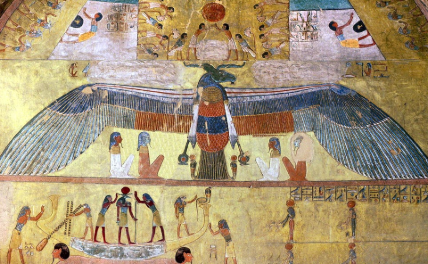1-2
and·he-is-becoming word-of ieue to·me to·to-say-of son-of human propound-you ! enigma and·quote-you ! proverb to house-of ishral
And the word of the LORD came unto me, saying Son of man, put forth a riddle, and speak a parable unto the house of Israel
enigma context:
therefore not about “literal Babylon 500BC”; here again showing how this theme need to be understood by the house,
line,
“and it is becoming / the word (in the the right direction) of / IEUE / to me /, tofor to say: /, son of / the adm-male /, put-forth-you (present a knot) ! / a riddle (enigma) /, +
and quote-you ! / a parable / to / the house of / Israel (potential 120,000) /;
3-4
and·you-say thus he-says my-Lord ieue the·vulture the·great great-of the·wings long-of the·pinion full the·feather which to·him the·embroidery
he-comes to the·Lebanon and·he-is-taking wooly-foliage-of the·cedar rash top-of suckers-of·him he-plucks and·he-is-bringing·him to land-of Canaan in·city-of ones-trading he-places·him
Thus saith the Lord GOD; A great eagle with great wings, longwinged, full of feathers, which had divers colours, came unto Lebanon, and took the highest branch of the cedar: He cropped off the top of his young twigs, and carried it into a land of traffick; he set it in a city of merchants
|
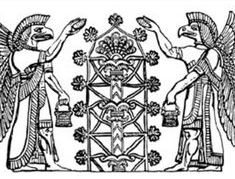 |
- – ‘feather’, H5327 nats-ah ‘to fight, quarrel, ruin’ 11x; inversal of tsiun; the example in Lev.1:16 is very vague – ‘crop’ should be something very negative (rah, -ra, evil) then follows ‘feathers’; we can read “take out the intestines (?) as ruinous inversal and throw them away” or something alike,
- – ‘top’, H6788 tsammereth ‘top (of tree)’ 5x; tsemer ‘wool’ 15x; tsame ‘thirst’ 10x; tsamm-ah ‘veil, (hair) locks’ 4x (double-m);
- – ‘twig’ , H3242 yeniq-ah ‘twigs’ 1x; yanaq ‘nurse, to nurse’ 32x; from root -yana ‘dove’, term returns (changed) later on in chapter;
line and aspects context:
dangerous territory, and every term has a double meaning, but let’s see;
- 1) ruining inversions; we dropped the ‘feathers’ totally, to not interfere the inversion theme (feather too vague, see note); when adressing the “nature” of this eagle, then ‘ruining inversions’ are well put — since their bordersky is similar (see Ze. chapter, where the scroll-sky outside of the eden-gate is full of beetles and other unclean bugs); the inversion may also show in the one wing up, other wing down — akin to the bird-demon Pazuzu; and the same as the wings of the NEKHBET vulture. The theme here was ‘doubling’ (to make their land and sky north);
|
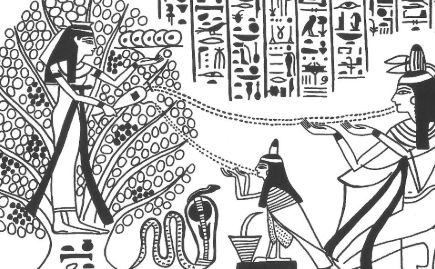 everythingselectric |
tree of life:
we suggest that “only the foilage is eden’s”, not the stem; later on in this chapter the “weak branches will be removed (out of the foilage)”, and in another posted we saw that Adam was “working to connect the wrong plants together”.
- – in the Nut picture, the queen and her Ba-soul are drinking, while the -tsame (wooly-foilage) also has “thirst” (tsame); in turn as glyph AB, the inversal of BA; and they are drinking “words as the eden-breath-air” NEFU, according to the text above them.
- – Nut (also Tefnut) is Tephanes; “put the both rocks in the clay of the kiln which is at the entrance of Pharaoh’s palace in Tephanes”, but we do not know yet if this tree is the same as the Seshat flame of Thoth (see diagrams) — that Akkadian depictions show ‘7 flames’ from this tree may represent the same flame;
line,
“and you say: / thus / he – IEUE – mylord – says: / slowly – the – great – eagle – (being) great of – wings – passes over (to other dimension) /, and (is) full of / ruining inversions (of tsiun) / which / (are) the embroidery (outside colours) – to him /, he comes / to / the Lebanon (“white”, northside of adamite-throne?) /, and he is taking / the (veil as) woolly foliage of / the cedar /; he plucks – the top of / it’s (nurturing) twigs (from the dove) /, and he is bringing it / to / the land of / Canaan (in top of outer-court) /, (and) in the city of / traders (Õn,Tyre) / he sets it up /;
5-6
he-is-taking from·seed-of the·land and·he-is-giving·him in·field-of seed he-takes on waters many-ones willow he-places·him and·he-is-sprouting and·he-is-becoming to·vine one-extending low-of stature to·to-face-about-of branches-of·him to·him and·roots-of·him under·him they-are-becoming and·she-is-becoming to·vine and·she-is-makingdo poles and·she-is-putting-forth foliages
He took also of the seed of the land, and planted it in a fruitful field; he placed [it] by great waters, [and] set it [as] a willow tree And it grew, and became a spreading vine of low stature, whose branches turned toward him, and the roots thereof were under him: so it became a vine, and brought forth branches, and shot forth sprigs
|
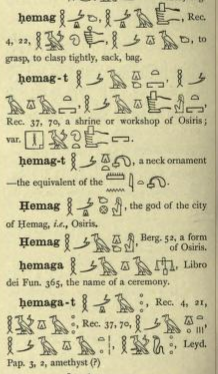 |
- 2) (out of several possibilities) glyph H’EMAG comes close; amethyst (may be diamond), the type grasping looks like the lower half of the thunderbolt; “the house (of that form) to grasp / for throne-G / to reap / for wick-H”; in spells we only saw H’EMATT untill now, “the house at double-place-T to reap for wick-H”,
- 3) in posted Ez.16 line 4 is “you were not rubbed with salt”, where the H’EM-cluster has also H’EMAIT ‘salt’ (salt of adamite-throne to reap); H’EMA ‘circular object’ (poles standing in a ring to go reap?); cluster turning to H’EM;
| thunderbolt context: to right the vajra as “the thunderbolt of Indra” (behemoth realm north); suppose our interpretation of the used terms is correct: then the lower-half of that bolt is the adamite-throne – even showing “the poles standing vertical around an axis”, (and surrounded by a ‘veil’ or foilage, or locks); The “willow tree” is the thick pole inbetween both ends, and the text describes “an inverted growth, making an inverted copy, into their north”, as the upper end of the thunderbolt. |
 wiki |
- 2)
willow tree as glyph THERT, “place-T for speech to connect to (eden)”, stepdown of TER “(place-T of) eden-speech of Light”; in another page (posted december) it is the “false vine” inbetween the vine and the fruits (now atop of hím);
line,
“andfor he is taking / from the seed of / the land (eden’s) /, and he is giving it / (to be) inas the Field (north) of – Seed /, he takes – (and) sets up – the willow tree (as ‘pump’) – on – many – waters (eden-dimension) /; and he (tree) is sprouting /, +
and – is becoming / toas – the extended – eden-vine / (who) (is) low (humble) of / (cubital) height /, toby to turn / his branches (sucking-up water) / totowards him /, (being) andas his roots / becoming – under him /, and she is becoming / toas the eden-vine / andfor she is making / the (surrounding vertical?) poles /, and she puts forth / branches (as the winepress Shemsu?) /;
7-8
and·he-is-becoming vulture one great great-of wings and·many-of feather and·behold ! the·vine the·this she-starves roots-of·her on·him and·branches-of·him she-msends to·him to·to-irrigate-of her from·beds-of planting-of·her to field good to waters many-ones she being-transplanted to·to-makedo-of bough and·to·to-bear-of fruit to·to-become-of to·vine-of noble
There was also another great eagle with great wings and many feathers: and, behold, this vine did bend her roots toward him, and shot forth her branches toward him, that he might water it by the furrows of her plantation It was planted in a good soil by great waters, that it might bring forth branches, and that it might bear fruit, that it might be a goodly vine
- – ‘another’, H259 echad ‘one, 1’ 967x; glyph UÃ, derived from the other ?
- – ‘to bend’, H3719 kaphan ‘to bend’ 1x; kaphan ‘famine’ 2x; from -kaph ‘handpalm’,
egypte eternelle org
- – ‘branches’, h6057 anaph ‘bough, branch’ 7x; on + aph,
many and noble context:
the “many (waters)” is always Negative (rab, -ra evil), compare the whore sitting at many waters; and similar is the use of (adr) as ‘noble’; but compare line 23;
great eagle context:
in tomb mural to right, the mid-section is the outer court, and above that the Sekht-fields, and his both legs standing upon both mountains (Samaria and tsiun). If “wing” (kanaph) is also “end, corner of the land” then perhaps the wing denotes “carrying their new land north” as Geb, which is more like ‘hoovering above eden’…?
line,
“and he is becoming – one – great – eagle /, great of / wings / andas many / ruining inversions /, and behold ! / these – eden-vine – roots – starve (by handpalm) / onby him /, andfor – she sends – his branches (sucking-up water) / to him /, toby – her – to (go) irrigate / from the beds of / her planting /; tofróm – the (eden-) good – field / she (is) being transplanted – to the – many – (matrix-) waters / +
to go make / the bough (nostril+Õn?) /, and tofor to bear / fruit / toby to become / toas the eden-vine of / (matrix-) nobility (adr) /;
9
say-you ! thus he-says my-Lord ieue she-shall-prosper ?·not roots-of·her he-shall-pull-away and fruit-of·her he-is-blighted and·he-dries-up all-of preying-ones-of sprouting-of·her she-shall-dry-up and·not in·arm great and·in·people many to·to-take-up-of her from·roots-of·her
Thus saith the Lord GOD; Shall it prosper? shall he not pull up the roots thereof, and cut off the fruit thereof, that it wither? it shall wither in all the leaves of her spring, even without great power or many people to pluck it up by the roots thereof
- – ‘wither’, H7082 qasas ‘cut off’ 1x; qeseth ‘writing-case, inkhorn (of scribes of m-realm)’ 3x; only qush ‘ensnare’ 1x, small root,
[review] line:
this one ‘s too Tricky even for us: interlinear has no ‘questionmark’ at the first “shall she prosper”, and we are not sure if this line juxtaposes next line 10; the “arm” is -za ‘eden-power’, the line appears to sketch what will happen when their construct would continue like this,
line,
“say-you ! /, thus / he – IEUE – mylord / says: / she shall prosper /; [review]
shall he (matrix) – not – tear off – her (eden?-) roots / and – he withers (?) – her fruits ? /; andfor he dries up (inverse watercourse) / all / the (ones being preyed upon?) /, (and) the (eden-) spring of growth / shall dry up (inverse w-course) /, and – nót – (be) inas the – great – arm (IEUE power) / andfor – inas the – many – people (eden?) / +
toby to take (carry) – her / from her roots /;
10
and·behold ! being-transplanted ?·she-shall-prosper ?·not as·to-touch-of in·her wind-of the·east she-shall-dry-up to-dry-up on beds-of sprouting-of·her she-shall-dry-up
Yea, behold, [being] planted, shall it prosper? shall it not utterly wither, when the east wind toucheth it? it shall wither in the furrows where it grew
- – ‘planted’, interlinear rightly as ‘transplanted’;
line,
“andbut behold ! (now having been) transplanted: / shall she (the vine) prosper ? /; (is) (it) not / aswhen – the east – wind – touches – (in) her /, she shall dry up (to dry up) ? /; onfor – the beds of / her sprouting / shall dry up /;
11-12
and·he-is-becoming word-of ieue to·me to·to-say-of say-you ! please ! to·house-of the·rebellion ?·not you-know what ? these say-you ! behold ! he-comes king-of Babylon Jerusalem and·he-is-taking king-of·her and chiefs-of·her and·he-is-bringing them to·him Babylon·ward
Moreover the word of the LORD came unto me, saying Say now to the rebellious house, Know ye not what these [things mean]? tell [them], Behold, the king of Babylon is come to Jerusalem, and hath taken the king thereof, and the princes thereof, and led them with him to Babylon
- – ‘rebellious’, H4805 meri ‘rebellion’ 23x; from -mar ‘bitter’ as matrix-rule;
rebellious context:
we saw many times the same type Rant, as if almost unfair – how could they (or we) even remotely know… ? but perhaps this is an option: in the time these chapters were said, the new-egypt kingdoms still existed (and therefore all the information), and it would have been possible to go study whát (the spells) were about: before that information would shut Down, the next 2000 years…..? (this shutting-down being the sealed-up vision in Daniel, the ‘snare’ in the book of Habakuk, etc);
situation context:
after the eagle it does not mean that now is being switched to 500BC reality, because of the next lines following upon this one;
king and chiefs context:
we must assume the king is Adam, because the word returns later; that the somewhat negative term king and princes (sr) is used, must be because they got into a fallen state, already;
line,
“and it is becoming / the word (in the the right direction) of / IEUE / to me / tofor to say: /, say-you ! please ! / to – the rebellious (loving matrix-rule) – house (only ishral?): /(do) you – not – know – what – (are) these ? /; say-you (to them) !: / the king (Thoth) of / Babylon (torso) / enters / Jerusalem (eden-earth) /, and he is taking / her / king (Adam) / and / her princes (adamite-originals) /, and he is bringing – them – to him /, towards Babylon /;
13-14
and·he-is-taking from·seed-of the·royalty and·he-is-cutting with·him covenant and·he-is-bringing him in·imprecation and subjectors-of the·land he-takes to·to-become-of kingdom low to·so-as-not to-lift-up-himself-of to·to-keep-of covenant-of·him to·to-stand-of·her
And hath taken of the king’s seed, and made a covenant with him, and hath taken an oath of him: he hath also taken the mighty of the land That the kingdom might be base, that it might not lift itself up, [but] that by keeping of his covenant it might stand
- – ‘oath’, H423 alah ‘curse’ 36x; oath colour as curse; alah ‘ascend’ (many);
- – ‘mighty’, H352 ayil ‘ram’ (terebinth, projecting pillar, leader-chief) 183x; deity+state of being; why would interl. use ‘subjectors’ ? ram=dual (lampstand); in Ez. often (door-)post of gate; and preferrably so because this too is Ez.;
doorposts context:
term used here is “ram”, and see the ram mural in Ramses tomb, above; later on, Ezekiel measures the temple, and many door-posts appear there, we found the analogy of them being “the vertices of the eden-cube”, but may have to finetune, grin. However, suppose these were “placed together (by Adam), now forming some central pillar (see ram mural) for them”, and compare the 4 pillars holding up their boat (in diagrams);
important: several players and covenant context:
the next few lines refused to make any Sense, untill seeing that
- 1) after eden fell, a “covenant” was made between IEUE and Thoth – however strange that sounds, but compare a hostile divorce;
- 2) but then Thoth made anóther type covenant with Adam, separately, making Adam to transgress the previous mentioned covenant; weadded (another) to show the difference;
- 3) these lines are about “the treason of Adam and the dragon Egypt” because Thoth (as king of Babylon) will be dealt with in other chapters,
line,
“and he (Thoth) is taking / from – the royal – seed /, and he is cutting – a covenant – with him (Adam) /, and he (Thoth) is bringing / him (Adam) / inunder aanother oath (as curse) /, and he (Adam) takes – the doorposts (vertical cube vertexes) of / the land (eden) /; +
(in order) tofor (eden) to become / the lower (humble) / kingdom / to so-as-notprevent / lifting itself up /, toas to keep / his covenant (to Thoth) / tofor to stand (be valid) /;
15
and·he-is-revolting in·him to·to-send-of messengers-of·him Egypt to·to-give-of to·him horses and·people many ?·he-shall-prosper ?·he-shall-escape the·one-doing-of these and·he-annuls covenant and·he-escapes
But he rebelled against him in sending his ambassadors into Egypt, that they might give him horses and much people. Shall he prosper? shall he escape that doeth such [things]? or shall he break the covenant, and be delivered?
horses context:
though the line appears to say so, the horses are not fróm IEUE, since ‘horses’ are always Negative (comp. Revelation); but as “some type energetic blueprint for physicality” which Adam likely is changing to be fit for them spirits;
line,
andyet he (Adam) is rebelling (matrix-rule) / inagainst him (IEUE) /, toby to (cause to be) sent / his (IEUE’s) angels / (to) Egypt (Sekht-field north) /, tofor to give / the horses (phys. blueprints) – andfor the – many – people (spirits) – to him (the field): / shall he (Adam) prosper ? /, shall – the one doing – these – escape ? /, andfor he annulls / the covenant (with IEUE) / andyet he escapes (it) /;
16
life I averment-of my-Lord ieue if not in·placeri-of the·king the·one-making-king him whom he-despises imprecation-of·him and·whom he-annuls covenant-of·him with·him in·midst-of Babylon he-shall-die
[As] I live, saith the Lord GOD, surely in the place [where] the king [dwelleth] that made him king, whose oath he despised, and whose covenant he brake, [even] with him in the midst of Babylon he shall die
life context:
perhaps another version can be found; yet we saw that when IEUE makes an oath, it is “by the Watercourse”, hence the version here,
line,
“I – (am) (eden-) life /, (being) the declaration of / mylord / IEUE /, ifsurely / not / the king (Adam) – (is) in the place of – the one máking the king (IEUE) /, him / who / despises / his oath (as curse) / and whom / anulls / his covenant / with him (IEUE) /, he (Adam) shall die – in the midst of – Babylon (torso in outer-court) /;
17-18
and·not in·army great and·in·assembly vast he-shall-do him Pharaoh in·the·battle in·to-pour-out-of earthwork and·in·to-build-of siege-work to·to-cut-off-of nphshuth souls many-ones and·he-despises imprecation to·to-cannul-of covenant and·behold ! he-gave hand-of·him and·all-of these he-does not he-shall-escape
Neither shall Pharaoh with [his] mighty army and great company make for him in the war, by casting up mounts, and building forts, to cut off many persons Seeing he despised the oath by breaking the covenant, when, lo, he had given his hand, and hath done all these [things], he shall not escape
- – ‘mounts’, H1785 dayeq ‘siege wall’ 6x; daq ‘small, thin’ 15x ?; daq ‘dimensional veil’ 1x, related to doubled sky north; hand related (d), as “from new-hand to eden-throne” ?
| subject change context: now Adam has been dealt with, Pharaoh is next – since he (as Sekht-fields) profited from what Adam had built for them (the stealing of the vertices could create their siegeramp); we think that the legal right to destroy now Pharaoh, is because Adam has been judged, previously; |
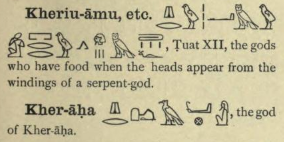 |
|
 |
hand context:
we would think “making a deal by shaking hands”, but this is prophecy and the themes are far too important for mere flowery trivialities; textglyph to right KHET’, in CT also shown with ‘upside-down boat’. The “hand” as executive region of the adamite throne ascended and was inversed by them — likely to produce the things fór the Sekht field; this region in scripture as Raamah; The hand-glyph T’ is visible, and indeed into the North (from eden); stepdown as KHETEM-seal, Haggai 2 (the ring at Õn-gate),
line,
“and – he – Pharaoh (dragon as Sekht-field north) – nót -shall do – battle (to eden) (anymore) / +
inwith a – great – army – and inwith a – vast – company – /, inby the poured-out / siegeramp (Horus-tile) / and inby to build / the siegewall (dimensional veil) /, (in order) tofor to cut off / the many – adamite souls /; andfor he (too) despises / the (cursed) oath / toby to annull / the covenant (with IEUE) /; and behold ! / he (has) set up / his (inversed-) hand (executive region where Adam is) /, andfor all of / these / he does / he shall – nót – escape /;
19-20
therefore thus he-says my-Lord ieue life I if not imprecation-of·me which he-despises and·covenant-of·me which he-annuls and·I-give·him in·head-of·him and·I-spread over·him net-of·me and·he-is-grasped in·weir-of·me and·I-bring·him Babylon·ward and·I-am-judged with·him there offense-of·him which he-offended in·me
Therefore thus saith the Lord GOD; [As] I live, surely mine oath that he hath despised, and my covenant that he hath broken, even it will I recompense upon his own head And I will spread my net upon him, and he shall be taken in my snare, and I will bring him to Babylon, and will plead with him there for his trespass that he hath trespassed against me
- – ‘surely’, H518 im ‘if, not, or, when, whether, surely, while, neither, saving, verily’,
- – ‘net’, H7568 resheth ‘net’ 22x; (SEKHT) said from -yarash ‘to possess’ (many); in Ez. 19 notes it seems to relate to ‘physical head’,
- – ‘snare’, H4686 matsuwd ‘stronghold (net)’ 25x; tsud ‘to hunt’ 13x +m-realm; tsad ‘(dimensional) side’ 33x; into ‘righteous’;
oath context:
first line could run different – we have problems with the “not” negation, but also with the ‘oath’ as very Negative term;
line context:
the Sekht-field is north of Babylon (torso), then it appears reasonable that he is brought down to their original mountain north,
line,
“therefore / thus / he – mylord – IEUE – says: /, I / (am) (eden-) life: / ifsurely (it) (was) not (just) / my oath (cursed) / which / he (Pharaoh) despises /, andbut my covenant / which / he annulls /, andso I give / inas his (own) summit (north-mountain Samaria?): / andfor I spread / my net (summit) – over him /, and he is grasped / in my snare (dimensional side) /, and I bring him / towards Babylon (outer-court) / and I (cause) – (as) he – (to be) judged – there /, (for) his (own) offense (m-realm as deity) / (through) which / he offended / inagainst me /;
21
and all-of fugutives-of·him in·all-of combatants-of·him in·the·sword they-shall-fall and·the·ones-nremaining to·every-of wind they-shall-be-spread and·you-know that I ieue I-spoke
And all his fugitives with all his bands shall fall by the sword, and they that remain shall be scattered toward all winds: and ye shall know that I the LORD have spoken [it]
- – ‘fugitives’, H5015 mibrach ‘fugitive’ 1x; said other reading of mibchar ‘choice, best’; barach ‘flee’ 65x; from -bar ‘son’ ?
line,
“and / all of / his fugitives (sons?) / inas all / his troops / shall fall – inby the sword /; and the ones remaining / shall be scattered – to every – cardinal direction /, and you (will) know / that / I / IEUE / (have) spoken /;
22
thus he-says my-Lord ieue and·I-take I from·wooly-foliage-of the·cedar the·one-being-high and·I-give from·top-of layer-plants-of·him tender-one I-shall-pluck and·I-transplant I on mountain lofty and·eminent
Thus saith the Lord GOD; I will also take of the highest branch of the high cedar, and will set [it]; I will crop off from the top of his young twigs a tender one, and will plant [it] upon an high mountain and eminent
- – ‘highest branch’, H3127 yoneqeth ‘branch, shoot’ 6x; linked to -yana and ya’an (dove and ostrich) in the tricky Anzu-bird chapter Zephaniah; yoneq ‘tender shoot’ 1x; root -yana;
- – ‘tender one’, H7390 rak ‘weak, soft, tender’ negative, -ra evil;
- – ’eminent’, H8524 talal ’eminent’ 1x; (‘compare hathal, no thanks); other dictionary: to deceive, to cheat (several), so from where ? tal-ah ‘to hang’ (to suspend) 28x; tel ‘heap’ 5x; tala ‘to hang’; (as glyph ÃKH ‘suspend on high’ ?) teli ‘quiver’ 1x (place TER ‘speech of light’ ? since words are arrows); we consider place-T the dimensional centre + deity, here as +doubled-diety (since place-T went North);
line context:
the whole last line (about the mountain) must be Negative (rak and talal), also because in next line 23 another mountain is being described, as juxtaposing;
- 2) if the dove is linked to the adamite throne, then Yonah who had to go to Nineveh (fish-souls pool, north) but escaped, should be related;
line,
“thus / he – my lord – IEUE – says: / andfor I take / from – the – exalted (new-throne) – cedar (great pillar) – the (veil as) woolley foliage /, and I give / from the top / his young twigs (of eden-dove as adamite-throne?) /, (and) the weak (for Rã) / I shall pluck-out /, and – I – transplant / (it) onfróm / the lofty (giants) – (matrix) mountain – andas doubled-place-T north /, +
23
in·mountain-of height-of ishral I-shall-transplant·him and·he-bears bough and·he-makesdo fruit and·he-becomes as·cedar noble and·they-tabernacle under·him every-of bird every-of wing in·shade-of branches-of·him they-shall-tabernacle
In the mountain of the height of Israel will I plant it: and it shall bring forth boughs, and bear fruit, and be a goodly cedar: and under it shall dwell all fowl of every wing; in the shadow of the branches thereof shall they dwell
- – ‘height’, H4791 marom ‘height’ 54x; m-realm+rom (as Raamah, the present new-adamite-throne as Isis, but now + m);
- – ‘branches’, H1800 dalith ‘branches’ 8x; dal ‘poor, helpless’ 47x; dal-ah ‘draw (water)’ 5x; deli ‘bucket’ 2x; deleth ‘door’ 88x;
interval context:
again a series of words are used with double colour, we saw in other pages that it’s used when describing the region during the Interval; compare the to-be (disfigured) lampstand Zerubbabel (diagrams), and that the (m-rum) ‘height’ is definitely somewhere high-up in the outer-court;
- 2) birds and wings; likely else as ‘animals’ – we saw ‘birds’ can also be “islands”, turning the strange word kanaph (‘wing, skirt, side, corner, edge, extremity, etc) to fit the ‘island’ when the idea of ‘land’ is applied; the text describing regions;
line,
“I shall transplant it – inupon the mountain – (being) the height of (mrum) – ishral (all eden-souls) /, and it bears / the branch (nostril+) / and he makes / the fruit /, and he becomes / as the – noble (adr) – cedar /, and – every – bird (island-construct?) – (and) every – wing (landcorner?) – tabernacle – underbeneath it /, they shall tabernacle – in the shade of / his branches (as doors?) /;
24
and·they-know all-of trees-of the·field that I ieue I-clay-low tree lofty I-elevate tree low I-dry-up tree sappy and·I-cause-to-bud tree dry
I ieue I-spoke and·I-do
And all the trees of the field shall know that I the LORD have brought down the high tree, have exalted the low tree, have dried up the green tree, and have made the dry tree to flourish: I the LORD have spoken and have done [it]
trees context:
we’re still not sure what “the tree” represents in a context like this, or as in “all the trees of eden envied the cedar”; perhaps linked to souls, as “their represents in the creational-world” ? (perhaps corn-stalks is the matrix-mimick from this same theme);
line,
“and – all of – the trees of – the field – (will) know / that / I / (am) IEUE /; I humble / the lofty (giants) – tree / (and) elevate (gb) / the humble – tree /; I go dry up / the fresh – tree / and I cause to bud / the dry – tree /; (for) I / IEUE / spoke (the right direction) / and I (will) do (it) /.
02.07. submitted – loNe – first version

